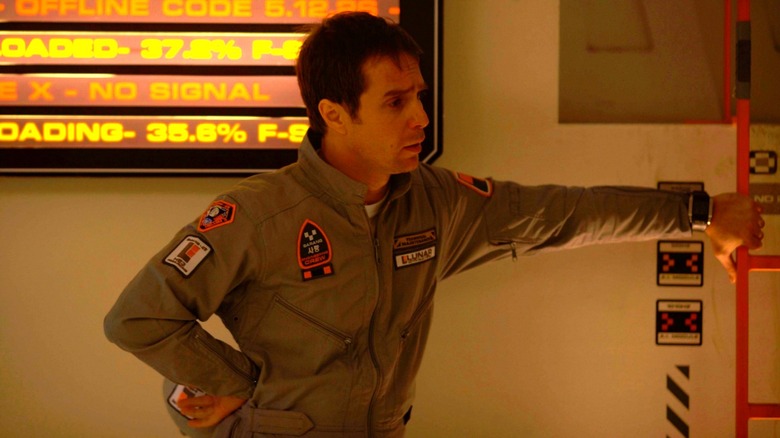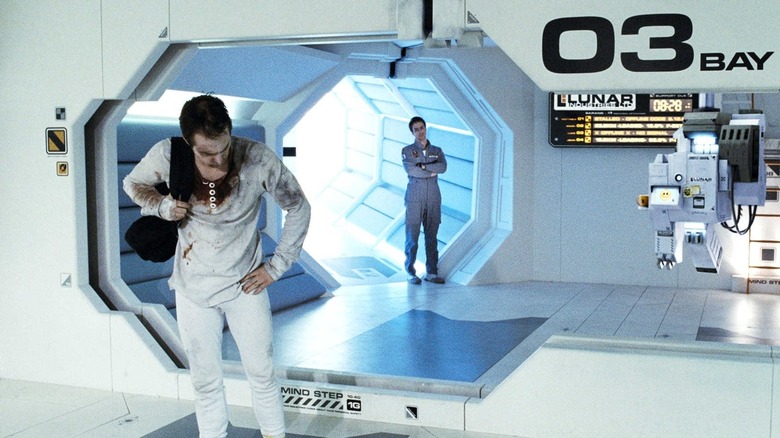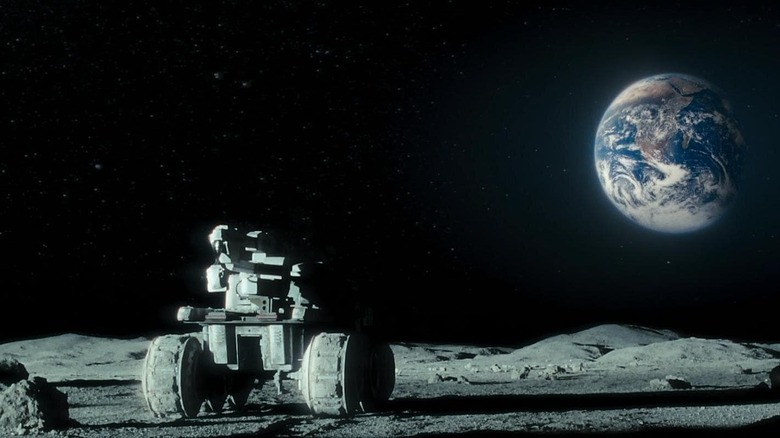Sam Rockwell's Comedic Timing Came In Handy On The Set Of Moon
Duncan Jones' 2009 sci-fi film "Moon" is about a lonesome miner named Sam (Sam Rockwell) who works a high-tech drilling facility on the titular heavenly body. In the future, Earth's oil resources have run out, and energy is produced by a new miracle fuel called Helium-3, which can only be found on the moon. The mining equipment is so advanced that the entire building can be run by one person. Sam is aided by an artificial intelligence named GERTY, voiced by Kevin Spacey. Sam misses his family and is growing weary. He even seems to be hallucinating, as he will occasionally see a strange hobo-like man stalking through the hallways.
After Sam experiences an accident while in a lunar rover and is knocked unconscious, he awakens back at base with no memory of his return. But GERTY is acting suspicious, holding secret conversations with home base back on Earth. Sam investigates the accident site and finds his own doppelgänger out in a rover. This person also insists that they are Sam. The lunar facility now has two Sams and a mystery to solve. Alien? Long lost brother? Is reality falling apart? And why is one of the Sams so sick? Rockwell played both versions of the character.
While "Moon" has a calming, down-to-earth (down-to-moon?) quality, Jones' production was, in fact, quite complicated. Acting opposite one's self provides a particular challenge, and Rockwell, in a 2009 interview with the Village Voice, talked about how he had to construct entire scenes when he could only play one half at a time.
The two Sams
The screenplay for "Moon" was credited to Nathan Parker, the screenwriter of the Jason Statham film "Blitz," 2017's "2:22," and the upcoming sci-fi film "Slingshot." By coincidence, both Jones and Parker have famous fathers. Jones is the son of legitimate space deity David Bowie, and Parker is the son of filmmaker Alan Parker, who directed "Bugsy Malone," "Pink Floyd: The Wall," "Angel Heart," "The Commitments," and "Angela's Ashes." When making "Moon," Jones and Rockwell worked together on Parker's script to conceive of scenes that the actor felt he could play more naturally. Some of Sam's scenes were discovered through improv and "playing both sides" exercises. Luckily, Rockwell was wise enough a performer to know that timing was everything. Equally lucky for audiences, Rockwell is a sublime comedic actor, and his talents definitely helped. As Rockwell said:
"I had worked on the script with the director, Duncan Jones, and we did some improvisations and we put them on videotape. I had a body double, and he was a young actor who I would work with sometimes. And sometimes I would work with a tennis ball, and I would act with myself. It was pretty complicated ... My sense of timing came in handy. Whether that be comic timing, or like dance or something. Timing was very instrumental in making it work."
It's difficult enough to develop banter or rapport with a co-star, and Rockwell found it even more difficult to develop banter with himself. The improv helped, but Rockwell also went to some notable sources for additional information.
The process
Rockwell walked the interviewer through his process, and how ad-libbing was anathema on one level and weirdly possible on another. Ultimately, the actor felt that developing a relationship between both Sams — characters that quickly developed noticeable differences — was the most important element of his scenes, and developing believable banter was key. Rockwell talked about the films that he researched, choosing a few peculiar films as examples of good male relationships. One of his research movies, though, was a no-brainer. One could do much worse than to study Jeremy Irons. Rockwell said:
"The first [take] that you'd shoot you'd have more room for improvisation. The second one you'd have to get it within the window of time – you had a space of time for your line. I could change the ad-libs as long as they fit the same amounts of beats. You could ad-lib but you had to be very clever about it, otherwise it wouldn't work. I watched Jeremy Irons in 'Dead Ringers' quite a bit. I watched a few other buddy movies. 'Midnight Cowboy' was definitely something I watched quite a bit."
John Schlesinger's "Midnight Cowboy" won the Academy Award for Best Picture in 1969, and told the story of a hayseed hustler (Jon Voight) trying to make his way in New York, aided by a low-down hood (Dustin Hoffman). The two characters have an uneasy friendship and often insult one another. It's quite a cold film. The choice to use "Midnight Cowboy" as an example of a "buddy movie" says more about Rockwell as a person than provides information about "Moon."
One can understand, then, why the two Sams bickered so much: As the old adage goes, there are two hustlers inside you.


